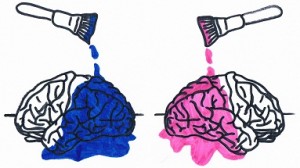I am happy to report that my friend and colleague, Cyd Cipolla, and I have receieved a grant from the Neuroethics Program at the Emory Center for Ethics to teach a class in the spring on “Feminism, Sexuality, and Neuroethics.”
We are very excited about this opportunity, and I look forward to reporting on our experiences with this course.
Here is our course description:
Neuroethics is an emerging field that considers the interaction between neuroscience, behavioral biology and society. Major questions of concern within neuroethics include: How do scientific discoveries impact society? How can scientific researchers more fully understand the ethical implications of their work? The intersection of feminist science studies with the field of Neuroethics produces new ways to ask these questions, considering, for example, not only how science impacts society, but how scientific research is shaped by cultural assumptions. Ultimately, students in this class will combine the critical thinking skills from both of these fields to answer the question: How can we all be responsible consumers and/or producers of neuroscientific knowledge?
Students in this class will learn the major topics and themes within the field of Neuroethics through critically examining historical and contemporary scientific research on sexuality and the brain. Each unit of the class focuses on a different area within the field of scientific research on sexuality and the brain. Students will read the significant scientific study or studies on the topic alongside reports about the study in mainstream news media outlets, and then follow this by reading critiques of the work from both inside and outside the scientific community.
For example, one unit focuses on neuroscience and homosexuality. We will begin by reading Simon LeVay’s 1991 Science article, “A difference in hypothalamic structure between heterosexual and homosexual men” alongside articles written about the study in The New York Times, The Washington Post, and Newsweek. We will then read a selection of responses to LeVay’s study both from others in his field, for example, the comment “Is Homosexuality Biological” by Marcia Barinaga that ran in Science, and from other disciplines, such as Peter Hegarty’s 1997 article, “Materializing the Hypothalamus” published in Feminism and Psychology.
This class is open to students in the sciences, social sciences, and humanities. No previous experience with neuroscience research or sexuality research is required.


